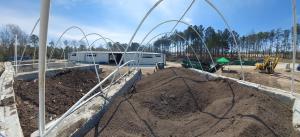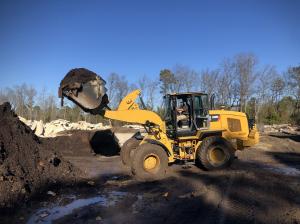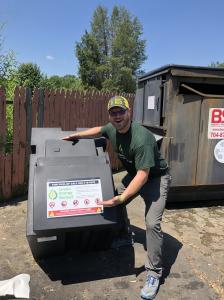ReSoil: The Premier, Zero-Landfill Destination for Organic Waste

Through ReSoil, Green Energy Biofuel's recently acquired composting facility, the company can offer landfill-free disposal options for organic waste from large, corporate generators.
Green Energy Biofuel recently purchased a composting site in Kershaw County, South Carolina, where its significant investments are optimizing operations.
WINNSBORO, SOUTH CAROLINA, USA, April 14, 2021 /EINPresswire.com/ -- South Carolina-based recycling firm Green Energy Biofuel recently acquired ReSoil, a composting facility in Kershaw County, one of the latest moves the growing company has made in over a decade to increase its services and open new opportunities for industrial processors near and far. GEB is making significant investments in its new composting business to help large waste generators in the region find a landfill-free option for disposal of difficult organic waste to meet regulatory and corporate demands as well as evolving consumer expectations.
“We’ve invested $160,000 in ReSoil before we even closed on the purchase—and we’re not done,” says BioJoe Renwick, GEB co-founder. “In 12 months, we’ll have put nearly $2 million into the composting business.”
GEB has spent four months in site preparation, making ReSoil a more efficient, resourceful facility to serve its existing customers and potential clients. Over a half-million pounds of recycled concrete, rock and grading clay sand was brought on site to modify the yard for operational improvements. GEB also poured over 100 yards of concrete, created eight bulk storage bays and a rainwater-capture system to hydrate the almost 800 cubic yards of compost it can produce every month. “This was a big project,” Renwick says.
The facility’s process flow has been modified to optimize efficiency. “We haven’t changed the composting process, just how the business is run and how compost moves through the facility to create efficiency,” Renwick explains.
The site features six 80-yard bays, each with a forced-air delivery system to pump fresh air into the compost, which increases the temperature and rate of decomposition. The parameters are maintained by electrical controllers and timers to achieve and maintain temperatures required for the process. Temperature is monitored regularly for it to be high enough to kill pathogens but low enough to not spontaneously combust.
Composting may seem like a simple process to the layman, but obtaining and maintaining permits takes research, training and sophistication. “We have a master composter who runs our site,” Renwick says. ReSoil’s compost is “Certified SC,” part of the Certified South Carolina Program, and has the U.S. Composting Council’s Seal of Testing Assurance (STA).
When organic waste is received, it is mixed with wood chips, which serve as a bulking agent, from one of two sources. Pure oak chips come from Pro Pallet South, a refurbished pallet manufacturer in Winnsboro, whose broken pallets are chipped and find new life in GEB’s engineered soil. Also, once a year the Kershaw County landfill grinds yard debris from the surrounding area, where GEB sources composting chips as well. In addition, clay sand from Kershaw Mining next door and vermiculite from Woodruff-based Palmetto Vermiculite are added in various recipe proportions to make five different engineered soils. Due to this local sourcing of material, ReSoil product has achieved the Certified SC label. The whole process—from waste in to screened, engineered soil out—takes 45 days.
While the high-quality compost material—sold in bulk up to 30 yards per tractor-trailer load for landscaping companies or delivered by GEB to individuals in eight-yard increments—is a sought-after remedy for nutrient-depleted lawns and gardens, the real benefit to the region of such a facility is its ability to receive industrial volumes of difficult organic waste streams from a variety of businesses.
Many corporations now track and publicize their carbon emissions. Landfilling organic waste generates methane, a powerful greenhouse gas. GEB’s ability to provide landfill-free disposal options to companies, whether they process food, agricultural products or other organic ingredients, can help mitigate carbon emissions while providing positive talking points for consumers, who are becoming increasingly conscious about the businesses they patronize and products they purchase.
Acquiring and optimizing ReSoil is just one of many evolutionary progressions GEB has made along its 14-year waste-recycling journey. In the late 2000s, it began as Midlands Biofuels, a collector and processor of used cooking oil (UCO), making biodiesel fuel at its plant in Winnsboro. As its collection accounts and abilities grew, GEB expanded into Tennessee and then closer to home in Aiken County, South Carolina, where it purchased a large-scale, idled manufacturing facility. GEB repurposed and invested heavily into the site to process and recycle 200,000 gallons per day of liquid organic waste—everything from UCO and trap grease from restaurants and large-scale food manufacturers to wastewater streams and sludge, with its recently obtained wastewater processing permit. With ReSoil, the company now has a beneficial outlet for organic solids too.
“Through our internal efforts to be a landfill-free company, we developed our business in such a way that now, not only are we landfill-free, but we can help other companies be the same,” Renwick says.
GEB is in the process of opening up even more doors to the recycling world. While it recently added line-jetting and tank-cleaning services for its industrial clients, the company has its sights set on a half-million-dollar investment in de-packaging equipment. This will allow GEB to further broaden the pool of waste it can accept, including new volumes of fats, oils and greases from single-use packages and bottles of salad dressing, condiments and more. In addition, this will add a valuable, environmentally friendly service to large food processors and preparers while also providing necessary streams to ReSoil from discarded, prepackaged food. Lastly, the plastic waste from the de-packaging unit will be recovered and provided to local businesses, such as South Carolina-based Trex®, for reuse in plastic decking and other innovative products. “We have already started recovering these waste streams for Trex®,” Renwick says.
It would cost millions of dollars for another company to put together a process like GEB’s to handle the waste it does. “Through our years of chipping away at the waste market we’re in, we have the opportunity to do what we’re doing now,” Renwick says. “We just love helping others and find great value in what we do for them, and for the great state of South Carolina.”
BioJoe Renwick
Green Energy Biofuel
+1 803-718-6323
biojoe@gebiofuel.com
Visit us on social media:
Facebook
Twitter
LinkedIn
Legal Disclaimer:
EIN Presswire provides this news content "as is" without warranty of any kind. We do not accept any responsibility or liability for the accuracy, content, images, videos, licenses, completeness, legality, or reliability of the information contained in this article. If you have any complaints or copyright issues related to this article, kindly contact the author above.


